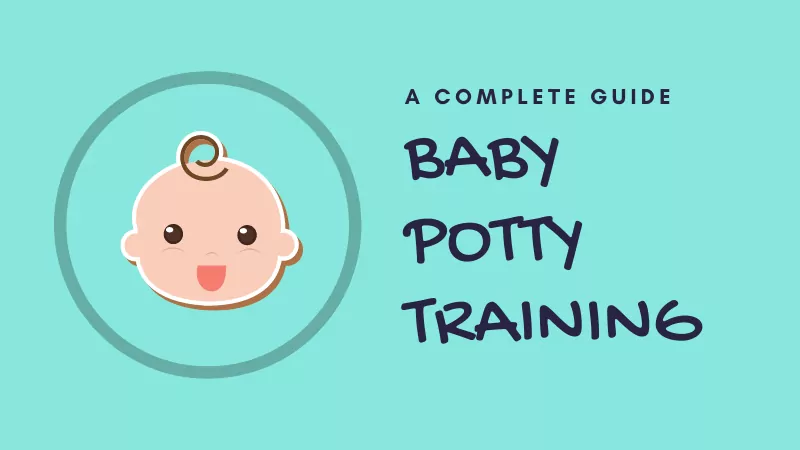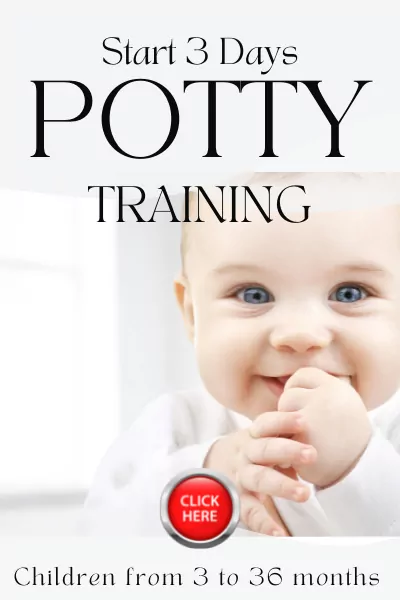
What does it mean to Baby Potty Training?
Potty training is also known as Toilet Training. Baby Potty Training means teaching your baby to urinate or pass urine while sitting in the toilet or on the potty seat before he/she is one year old.
Baby Toilet Training does not mean that the baby will go to the toilet on his/her own to pass urine or defecation. Baby Potty Training means that whenever it looks like your baby is about to urinate or defecate, you or someone else taking care of your baby will have to take her/him to the toilet.
Usually, we take potty training to mean that the baby will be able to urinate or defecate in the toilet on his/her own, but it is not so. Babies are not physically or emotionally ready to use the toilet this way until they are between 18 months and 3 years old. The ability to control the bladder develops between 18 months and two years old.
So, When you are giving toilet training to your baby, It really means that you are explaining to the baby that the toilet is used to pass stool or urine.
When a baby is between eight and nine months old, he/she may make a characteristic signal or sound to urine discharge or have defecation and may use them to tell you whenever he/she needs to go to the toilet. However, the Baby cannot control stool or urine until the baby reaches the toilet. The baby may use that signal or sound when the baby is passing or about to pass stool or urine.
When should I start potty training for my baby?
Moms always look for baby potty training age. You can start toilet training your baby whenever you want. You need to understand the signs your child is not ready for potty training. However, your expectations from your baby should be based on his/her age and developmental stage.
Some parents start toilet training for their baby at the age of one month. However, some experts do not consider starting your baby’s potty training too early. They say that the baby is not yet physically and emotionally ready for toilet training.
But in India, Infant Potty Training has been passed down from generation to generation. And as a result, most children do not urinate during the day in pyjamas or underwear until they are two or two and a half years old.
If you want to start toilet training for your baby, it is best to start it when your kid is eight or nine months old. By this time, he/she will be sitting with full confidence and taking solid food thrice a day.
It is better to start potty training only after your baby has started eating solid food because when he/she starts eating solid food, their urine and bowel movements also change.
However, when your baby starts on solids, their stools become a lot more like an adult’s and he/she may stick to a routine of passing only once a day. If your baby is on formula milk, he/she may already have this type of stool.
When you start potty training your baby, it should not be at a time when there is a big change in your child’s life. For example, if you have another little guest coming into your house or you need to move to a new house, it is a correct time to start potty training your baby a week before that.
Babies like the same routine and any major change can upset him and cause changes in his behaviour. You have to choose a time for toilet training when you can give your baby all your time and you don’t have to travel or make any other changes.
How to teach potty training to my baby?
Keep notice your baby and understand his stool or urination pattern. How and When often does your baby urinate? Does the baby always defecate at certain times of the day, like after getting up or at some other time? Does he/she make any special sounds, gestures or gestures while passing stool or urinating?
Once you have a little understanding of this pattern, you can start by doing the following:
Make use of sound
When the baby is a passing stool or urinating, make a sound that the baby may associate with stool or urination. Many parents make ‘ssssssss’ or some other water-like sound, while others use a specific word or phrase such as ‘Go Potty’. Repeat this sound or sentence over and over again whenever you notice that the baby is about to pass or urinate. This will cause him to see this as a signal and associate the urge to defecate with the use of the potty.
Make a sign/body language
Use a specific gesture every time your baby poops or urinates and says words like susu or potty each time. Your baby will soon be able to associate stool or urination with that sign and may be able to tell you that he needs to pass or urinate even before he starts speaking. These cues should be very simple, such as pointing toward the ground between your legs or your buttocks. When your baby starts repeating these signs, take him to the toilet immediately.
Taking to the toilet regularly
Make sure you take your baby to the toilet at regular intervals, such as every half an hour or so. This way he will get used to using the toilet and gradually he will begin to associate the toilet with stool or urination.
Keep the baby entertained on the toilet seat
When he’s on the potty, you can keep his attention with songs, toys or books, whatever he enjoys the most. The process of defecation training for a child can be a little easier if he gets his attention on the favourite thing. However, some moms find that focusing on something else diverts the baby’s attention away from the bowel movement as well.
What are the things to keep in mind while potty training your baby?
Keep trying
You may feel a little relieved when your baby understands the routine of potty training and lets you know with cues or sounds when you have a bowel movement or urination. You may start to believe that your baby will let you know whenever you need to go to the toilet.
Even if your baby has started to tell you about his need for the toilet, if he is busy with a toy or game, he may forget to signal or make a sound for the toilet. So you have to be alert and take him to the toilet at regular intervals, whether he shows any signs of it or not.
Be prepared for the unexpected
The unexpected and sudden passing of stool or urine by your baby is only part of the process of toilet training. So be prepared to change and clean her clothes, especially in the initial stages. Respond calmly to a sudden passing of stool or urine, no matter how upset it is, but don’t scold your baby about it. After your baby has passed an accidental stool or urinate, put him on the potty seat and explain that he needs to urinate or defecate here.
Adapt to the situation
There will be times when you will need to have your baby in a diaper again. Starting baby potty training doesn’t mean you don’t have to diaper your baby at all. For example, you can keep the baby without a diaper for some time during the day or for the whole day but wear it at night. Wear cloth diapers or nappies whenever possible, as disposable diapers tend to absorb urine and the baby often doesn’t feel wet or pooped.
Keep encouraging your baby
Your child will want praise for this new skill. Don’t disappoint him. Praise his progress by clapping or smiling whenever he learns something new or tries to use the potty seat. Show him that you are proud of him. However, don’t overdo it or he may panic or fear making the mistake again.
Be positive
No matter what age your child takes potty training, the process should be done in a calm and positive manner. There should be a little laughter and encouragement in it. Your goal is for the child to understand their body’s routine and feel good about using the toilet. Do not scold or punish your baby for urinating suddenly. This will make potty training more difficult for both of you.
Frequently Asked Questions
-
What is the best age to start baby potty training?
You can start baby potty training at any time but it should depend on your babies age and development stage. You can start it when your kid is 8 or 9 years old as at that stage as your baby can sit confidently and eating solid food thrice a day.
-
What is Baby Potty Training
Baby Potty training is to teach your baby to defecate or urinate while setting in a baby toilet seat.




